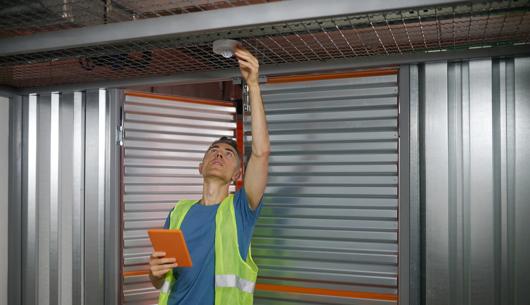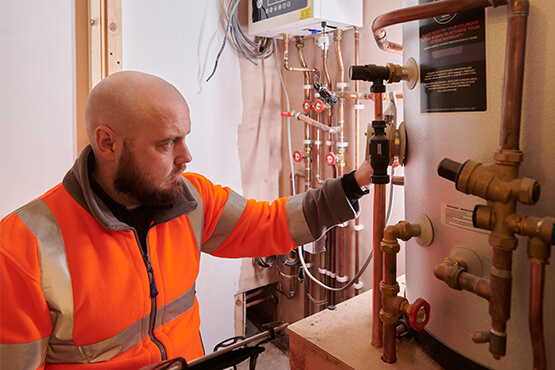380+ C-suite leaders from £100m+ businesses across the manufacturing, real estate and construction, retail and supply chain, technology, and energy and infrastructure sectors share their optimistic outlook for M&A inward investment deals in the coming year.
Foreword from Declan Cushley, Partner and Co-head of Corporates Strategy
Appetite for dealmaking, particularly inbound M&A, is a crucial indicator of economic health. So too is inward investment, whether in greenfield site projects, or in the expansion of existing operations. The early years of this decade saw global events significantly impact markets worldwide. From the pandemic to major conflicts, corporate confidence faced repeated setbacks. Our February 2025 survey revealed encouraging signs of returning confidence, demonstrating the resilience of M&A and inward investment activity even in complex circumstances.
2025 has brought fresh challenges with the US proposing comprehensive tariffs and the risk of countermeasures creating new volatility. However, the UK-US trade deal finalised in May 2025 represents a significant shift, with many tariffs now apparently stabilised, opening opportunities for transatlantic investment. For the UK, the agreement introduces targeted reductions and provisions designed to revitalise bilateral trade during global uncertainty. In the US-EU context, tariff discussions are ongoing.
These developments reinforce rather than contradict trends highlighted by our respondents. The need for robust domestic infrastructure, sovereign energy production and diversified supply chains has evolved from strategic planning to absolute necessity. Today's inward investment and M&A landscapes adapt to a world where national interests and trade exposures are primary investor considerations.
We surveyed 383 C-suite executives and business leaders in the UK and Ireland from £100m+ turnover businesses across five key sectors about their perspectives on M&A in 2025. The findings reveal optimism suggesting continued opportunities, though the data represents sentiment before recent economic disruptions. The recent trade agreement may help resolve these uncertainties soon.
Our report examines results by sector, providing insights and identifying barriers while contextualising findings against evolving trade relationships. We selected respondents from both the UK and Ireland given their strategic importance as bridges between the European Union and United States.
The high confidence levels in February can be partially attributed to the UK Government's focus on economic growth. The comprehensive Invest 2035 industrial strategy, in which Chancellor Rachel Reeves describes growth as "the number one mission of this government," identifies eight growth-driving sectors with pledges to remove barriers and provide support.
In January 2025, the UK Government published its Artificial Intelligence Opportunities Action Plan, outlining how it will lay the foundations to enable AI, change lives by embracing AI and secure the future with AI. Our respondents identified AI as crucial for future M&A activity, both in transforming dealmaking processes and as a high-growth sector.
In relation to Ireland, the country maintains its global reputation as a technology centre, and key inward investment location with its EU gateway position strengthened in recent years, offering advantages. Irish corporates must remain vigilant regarding EU regulations and US trade policy impacts.
Much of the cautious optimism stems from sector-specific factors rather than macroeconomic developments. Infrastructure, manufacturing and technology were already viewed as critical investment areas, not just for growth potential, but for enhancing domestic capabilities. The survey reflects these priorities, which grow increasingly significant.
These results provide a snapshot of sentiment at the beginning of 2025 - a moment of cautious optimism before recent disruptions. While conditions have shifted since, the data reveals themes in the sectors in focus and indicates the direction of investor thinking.
Across these two reports which explore the themes of the survey and what it means for certain sectors, our legal experts interpret this sentiment through current events to offer a comprehensive analysis of the inward investment and inbound M&A landscape.
Executive summary
1. 60% of respondents expect an increase in the volume of inbound M&A deals within their sectors over the next 12 months, indicating a cautiously optimistic outlook. In Ireland, confidence is even stronger, with 82% of respondents predicting a rise in M&A activity. 84% of respondents in food and drink manufacturing expect increased M&A activity, more than any other sector, driven by demand for sustainability and regional expansion.
2. On inward investment, 42% of respondents plan to invest in the UK outside of London, with North East (68%), North West (59%), and Northern Ireland (57%), standing out as regions sharing this view. In contrast, only 27% expect to invest in London, highlighting a growing regionalisation of investment. In Ireland, 48% plan to invest in-country, leveraging its EU access and stable regulatory regime.
3. 90% of respondents see access to technology and intellectual property as crucial for attracting investment. 77% anticipate that digital transformation, particularly AI, will significantly influence M&A activity over the next three to five years. Notably, AI is seen as a more decisive factor in Ireland, with 88% of respondents believing it will shape acquisitions and valuations, compared to 60% in the UK.
4. Post-Brexit regulatory divergence is creating both opportunities and complexities for cross-border M&A. While the UK’s more flexible approach to AI and data regulation is seen as a pro-investment stance, concerns about dual compliance costs and data adequacy risks are evident. 32% of UK respondents cited regulatory uncertainty as one of the biggest barriers to M&A activity and inward investment.
5. 73% of respondents expect increased private equity (PE) activity, with technology and infrastructure emerging as the most targeted sectors. With record levels of “dry powder”, PE firms are increasingly focusing on add-on acquisitions and high-growth sectors like AI, renewable energy, and healthcare. More respondents in the technology sector (86%) expect heightened private equity interest than in any other sector.
6. 56% of respondents view the new UK Government’s pro-growth and digital transformation policies positively for M&A, especially in technology and manufacturing. However, criticisms about a perceived southern bias in infrastructure investments, such as the Oxford–Cambridge Growth Corridor, highlight ongoing regional tensions. In Ireland, 62% expect their new government’s policies to boost inward investment.
7. 94% of respondents acknowledge that Environmental, Social, and Governance (ESG) plays a role in M&A decisions, but only 35% see it as a significant driver. The technology and real estate sectors lead in prioritising ESG factors, reflecting their focus on sustainability and compliance.
8. Warranty and Indemnity(W&I) insurance is gaining traction as a tool for managing M&A risks, with 78% of respondents viewing it positively. Adoption rates are higher in Ireland (94%) than in the UK (76%), indicating a maturing Irish market more focused on transaction protections.
9. Geopolitical tensions, including UK–EU regulatory divergence and evolving US trade policies, are shaping investment strategies. While 39% of respondents expect geopolitical risks to deter deals, 38% believe these tensions could lead to a surge in deals as investors seek stable markets in the UK and Ireland.
Methodology
The research was conducted by Censuswide, among a sample of 383 CEOs, CFOs, board members, and general counsel from across the key sectors of energy and infrastructure, technology, retail and supply chain, food and drink and construction in the UK and ROI. The data was collected between 23.01.2025 - 10.04.2025.
Censuswide abides by and employs members of the Market Research Society and follows the MRS code of conduct and ESOMAR principles. Censuswide is also a member of the British Polling Council.
Contents
- Investing in the UK and Ireland
- 1. The big picture: Expectations for inward investment and inbound M&A in 2025
- 2. Challenges and risks: Barriers to inbound M&A in the UK and Ireland
- 3. Geographical investment trends in UK and Ireland inbound M&A
- 4. Ireland: The gateway to Europe expects upward trend to continue with increased M&A in 2025
- 5. Shaping the future: The impact of AI and access to IP on the inward investment and inbound M&A
- M&A spotlights
- Conclusion: Inward investment in the UK and Ireland in 2025
Contact

Declan Cushley
Partner
declan.cushley@brownejacobson.com
+44 (0)20 7965 3991

Gavin Cummings
Partner
gavin.cummings@brownejacobson.com
+44 (0)115 976 6157









































